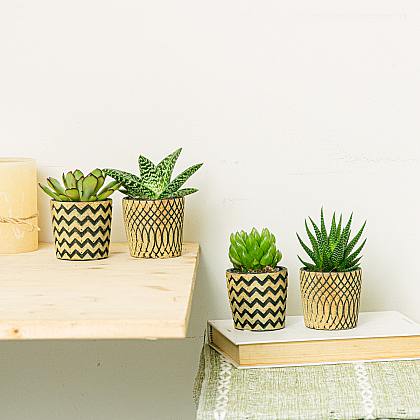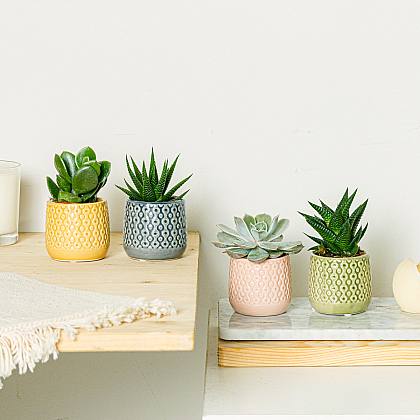Discover the millennial generation's love for houseplants and their power
The millennial generation's love for houseplants has been a growing trend in recent years. Why is this generation so interested in caring for these plants? In this article, you'll discover the reasons behind this trend and how it can help improve mental health
The millennial generation's love for houseplants has been a growing trend in recent years. Why is this generation so interested in caring for these plants? In this article, you'll discover the reasons behind this trend and how it can help improve mental health. We will also introduce you to the most popular plants among millennials and how you can decorate your home following current trends. In addition, we will explore the trend of urban gardening and the role of influencers in popularizing houseplants. Finally, we'll offer practical tips on how to take care of your houseplants and keep them healthy at all times.
Why do millennials love houseplants so much?
Millennials have a passionate love for houseplants, and this is due to several reasons. First and foremost, houseplants are a way to connect with nature in an increasingly dominant urban environment. For this generation, who have grown up surrounded by technology and with a fast-paced lifestyle, having plants at home gives them a sense of calm and balance.
In addition, houseplants are a way to express your unique personality and style. Millennials are constantly looking for ways to differentiate and stand out, and plants allow them to do so through the choice of species and the way they place them in their spaces. In addition, plant care and decorating has become a trend on social media such as Instagram, where millennials share photos of their homes full of greenery, which in turn inspires others to follow suit.
Another reason millennials love houseplants is because of their power to improve air quality and mental health. Scientific studies have shown that plants can purify the air by absorbing toxins and releasing oxygen. In addition, having plants at home has been shown to reduce stress, improve mood, and increase concentration.
In short, millennials love houseplants because they provide them with a connection to nature, allow them to express their unique personality and style, improve the air quality in their homes, and promote mental health. It is a trend that goes beyond aesthetics, becoming a lifestyle that perfectly suits your needs and values.
The Power of Plants to Improve Mental Health
Not only are houseplants a pretty home décor, but they also have the power to improve people's mental health. Numerous studies have shown that plants can reduce stress and anxiety, improve mood, and increase productivity at work and at home. This is because plants release oxygen and absorb carbon dioxide, which improves air quality and reduces indoor pollution levels. In addition, caring for and watering plants can be a relaxing and therapeutic activity that helps lower levels of cortisol, the stress hormone.
Some plants in particular are especially beneficial for mental health. Lavender, for example, has calming properties that can help reduce anxiety and improve sleep. Jasmine is another type of plant that has been shown to reduce stress levels and improve mood. Succulents are a great choice for those looking for an easy-to-care plant, as they require very little water and sunlight.
In short, having houseplants at home or in the workplace is not only an aesthetic form of décor, but it also has mental health benefits. Incorporating a few plants into your environment can be an effective and inexpensive way to reduce stress and improve your overall well-being.
The Most Popular Houseplants Among Millennials
The most popular houseplants among millennials are those that require little maintenance and easily fit into the tight spaces of modern apartments. These include the succulent, known for its resistance and variety of shapes and colors; the cactus, which in addition to being easy to care for, adds a touch of desert style to the décor; and the snake plant, which is ideal for those who don't have much experience in plant care, as it can survive with low light and watering.
Another very popular plant among millennials is the Monstera deliciosa, also known as Adam's rib, thanks to its large perforated leaves and tropical look. This plant has been trending on social media and has become a highly sought-after decorative element. In addition, Pothos, a hanging plant that is easy to propagate and maintain, is perfect for adding a touch of green to shelves or hanging pots.
These plants are not only appreciated for their aesthetics, but also for the benefits they bring to the environment. They help purify the air by absorbing toxins and releasing oxygen, which contributes to improved indoor air quality. In addition, having plants at home can have a positive effect on mental health, helping to reduce stress and increase feelings of well-being.
In short, the most popular houseplants among millennials are those that require little maintenance and easily adapt to tight spaces. Succulent, cactus, snake plant, Monstera deliciosa, and Pothos are some favorites due to their hardiness and aesthetics. In addition to beautifying spaces, these plants also contribute to improving air quality and promoting emotional well-being.
How to Decorate Your Home with Houseplants Following Current Trends
Decorating your home with houseplants is a trend that has gained popularity among the millennial generation. Following current trends, the important thing is to achieve a natural and fresh style, so the choice of plants is crucial. The most popular plants among millennials are those with large, green leaves such as Monstera deliciosa, Adam's Rib, or Ficus lyrata. To decorate, they can be placed in ceramic pots or wicker baskets to give a rustic and natural touch to the environment. In addition, different sizes and heights can be combined to create an interesting visual effect. Another aspect to consider is the location of the plants. It is important that they are located in places with good natural lighting, but not directly exposed to the sun to avoid leaf burn. They can also be placed on bookshelves, side tables, or hung from the ceiling to create a sense of height in the room. In short, decorating your home with houseplants is a current trend that not only brings a natural and fresh touch to the décor but also helps improve air quality and mental health.
The trend of urban gardening in the millennial generation
The trend of urban gardening in the millennial generation has gained popularity in recent years. Millennials, aware of the importance of healthy and sustainable eating, have found in growing their own food a way to connect with nature and reduce their environmental impact. In addition, growing urban gardens allows them to have access to fresh, pesticide-free produce, something they value highly.
For those who live in apartments or small spaces, there are several options for creating an urban garden. From hanging planters on balconies to vertical gardens on walls, there are creative solutions to suit different spaces.
The cultivation of urban gardens is also an activity that encourages community work. Many millennials join community projects where they share knowledge and resources to grow food collaboratively. This not only strengthens social bonds, but also promotes the local economy and responsible consumption.
In addition to the health and environmental benefits, urban gardening gives millennials an opportunity to learn about agriculture and nutrition. Through this experience, they can gain practical skills and useful knowledge to lead a more autonomous and sustainable life.
In summary, the trend of urban gardening among millennials is the result of an interest in healthy and sustainable eating, as well as a connection with nature. This practice allows them to enjoy fresh, chemical-free food, foster community, and gain valuable knowledge about agriculture and nutrition.
Influencers and Their Role in Popularizing Houseplants
Influencers have played a pivotal role in popularizing houseplants among millennials. Through their social networks, these opinion leaders have shown how to decorate homes and offices with plants, and how to grow and care for them. Many influencers have created tutorials and videos to teach their followers how to make custom pots, how to propagate plants, or how to make a vertical garden. In addition, some influencers have shared their personal experience of how plants have helped them improve their mental health and reduce stress.
Most influencers who promote houseplants have a practical and clear focus on passing on knowledge. They use simple and direct language, avoiding technicalities and specialized jargon. They also often show the latest trends in plant decoration, such as hanging pots, climbing plants or terrariums.
In addition, influencers not only promote decoration with plants, but also the cultivation of urban gardens and the adoption of more sustainable habits. They have shown that even in small spaces you can grow vegetables, fruits and aromatic herbs, which can contribute to healthier eating and reduce the ecological footprint.
In short, influencers have played a major role in popularizing houseplants among millennials. They have created educational and practical content that has helped many young people incorporate plants into their everyday lives.
Tips for taking care of your houseplants and keeping them healthy at all times
Tips to take care of your houseplants and keep them always healthy:
1. The right light: Place your houseplants in places where they will receive the right amount of light. Observe their needs and place them near windows or in well-lit areas.
2. Moderate watering: Avoid overwatering, as it can lead to root rot. Be sure to water your plants when the top layer of soil is dry to the touch. Remember that each plant has different watering needs.
3. Control humidity: Many houseplants thrive in humid environments. You can increase the humidity by placing a plate of water near them or using a humidifier.
4. Proper nutrients: Feed your plants regularly with houseplant-specific fertilizers. Follow the manufacturer's instructions and avoid overcharging, as this can damage them.
5. Pruning and cleaning: remove dead or diseased leaves to encourage healthy growth. Also, wipe away the dust accumulated on the leaves with a damp cloth gently to allow for better breathing.
6. Avoid sudden changes in temperature: Houseplants are sensitive to extreme temperature changes. Keep them away from hot or cold drafts and avoid placing them near radiators or air conditioners.
7. Check regularly for pests: Inspect your plants periodically for insects or diseases. If you find any pests, use natural methods or specific products to eliminate them.
By following these simple tips, you will be able to take care of your houseplants and keep them always healthy and beautiful, thus enjoying the benefits they provide to your home and emotional well-being.
And there you have it! Now you know why millennials love houseplants so much and how they can benefit your mental health. You also learned about the most popular plants and how to decorate your home following current trends, as well as the trend of urban gardening in this generation. Influencers also play an important role in popularizing houseplants, and we provide you with tips to keep your plants always healthy. We hope this article has been informative and educational, and that it has provided you with practical tools to improve your home and well-being. However, we can't help but wonder: what other lifestyle trends are millennials embracing them? How are these trends impacting your physical and emotional well-being? And what are the long-term implications of these cultural shifts? Let's reflect together!


